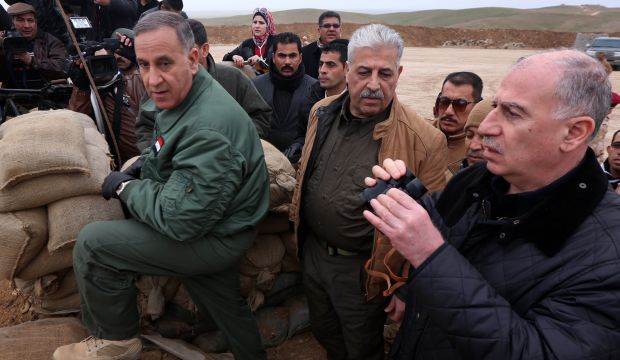
Iraqi Vice-President Osama Al-Nujaifi (R), Athil Al-Nujaifi, the governor of Mosul (C) and Iraqi Defense Minister Khalid Al-Obaidi visit a Kurdish Peshmerga position on the frontline in the Gwer, Iraq, on January 9, 2015. (AFP Photo/Safin Hamed)
Baghdad, Asharq Al-Awsat—Voluntary fighters from Mosul are ready to take part in the liberation of their city from the Islamic State of Iraq and Syria (ISIS), but suffer from an extreme shortage in weapons, Iraqi Vice-President Osama Al-Nujaifi told Asharq Al-Awsat following calls from Shi’ite militias to intervene in the Sunni-majority city.
Nujaifi, who is himself from Mosul, said military personnel from the city who are now receiving training elsewhere in Iraq are ready to drive out ISIS, but are in desperate need of more arms and ammunition.
“There are approximately 50,000 officers from the people of Mosul who are ready to take part in the battle of liberation but they do not have weapons to fight with,” said Nujaifi, who is the leader of the parliamentary Mutahidoun bloc.
“There is a comprehensive state of alert among the people in Mosul who want to take part in the liberation of their city and the number of volunteers who joined training camps in Kurdistan has exceeded 18,000,” he added.
Iraqi Shi’ite leader Moqtada Al-Sadr said in a statement earlier this week that his militia, Saraya Al-Salam (Brigades of Peace), was ready to take part in the liberation of Mosul if the process was led by Prime Minister Haider Al-Abadi, who is also the general commander of the Iraqi Armed Forces.
Sadr caused a stir this week when he blamed the predominantly-Sunni population of Mosul for the fall of Iraq’s second-largest city into the hands of ISIS, accusing them of negligence.
Mosul has been under ISIS’s control since last summer when the ultra-radical group launched a lightning attack, facing no resistance from the Iraqi army units positioned there.
“The people of Mosul are not responsible for the fall of their city,” said Nujaifi, blaming instead “the leaders who were not up to the level of responsibility they were assigned.”
A deal with Ankara to provide fighters in Mosul with military equipment has been signed, Nujaifi maintained, but “no weapons have arrived so far.”
An alliance between regular Iraqi forces and Shi’ite militias, known as Hashed Al-Shaabi, or Popular Mobilization forces, has been successful at driving out ISIS militants from several areas in Salah Al-Din province recently. A major military offensive is currently underway to liberate the city of Tikrit.
But many fear the Shi’ite militias will launch revenge attacks against the Sunni populations in the liberated areas whom they accuse of sympathizing with ISIS.
The fight on ISIS has rekindled sectarian tensions as the country’s Sunnis accuse the Shi’ite-dominated Baghdad government of failing to provide them with weapons and ammunition while supplying Shi’ite groups with arms.
Nujaifi said: “It is not an issue of being sensitive or dissatisfied with [the participation of Shi’ite militants] . . . it is about the [government’s] uneven armament [policy].”
“One training camp housing 7,000 fighters only has 2,000 rifles.”
